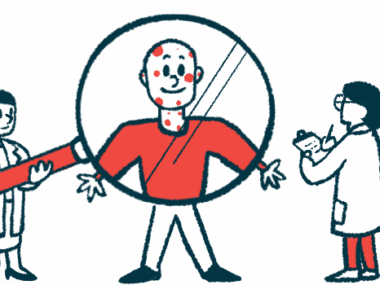My zebra spots are why I raise rare disease awareness
What it's like being an outlier within the SMA community
Written by |

As many readers of this column may know, SMA is considered a rare disease. But what some may not know, or simply overlook, is that people with SMA don’t share the exact same experiences.
When I think of my experiences, I think of math class — specifically, the lesson about means, medians, and outliers. Means were the averages of the data points, medians were the numbers in the middle of a data set, and outliers were the points outside the pattern on a line graph, skewing the results. Outliers were isolated in their own little worlds, making people scratch their heads as to how they got there in the first place. And they were the perfect representation of my life with SMA.
A few years ago, my doctor nicknamed me his spotted zebra because I’m often the outlier among those with an SMA diagnosis. My health has always required out-of-the-box thinking, and I’ve had additional hurdles to climb. I’ve surprised doctors with miraculous comebacks and strength for someone with SMA type 1.
My experiences have proven that I’m an outlier in an already rare community. This has certainly made life interesting. In preparing to write this column, I tried picking a moment when I felt most rare, but I couldn’t come up with only one occasion. After all, there’s a lot of inventory to take after 32 years.
What I realized, though, was that one occasion didn’t emphasize my rarity over another. Instead, it’s the little moments I live and breathe every single day. It’s when a doctor says they don’t know how to treat my symptoms. It’s when I hear, “Well, we’ve never seen this before,” as I desperately try to seek answers. It’s the moments when feeling like an outlier of my rare disease is both a blessing and a curse.
This is why I share my story. This is why I spread awareness about rare diseases like SMA. When I call myself an outlier, I know there are many other folks with rare diseases who can attest to feeling the same way. There’s more to a diagnosis than a textbook definition and the traditional way of doing things. And the more awareness our communities generate about our everyday lives, the more we educate others about the best possible care.
Living with a rare disease is all I’ve ever known. And being so immersed in the rare disease community actually makes my life feel somewhat normal. When I think about this and how my fellow outliers resonate with what I’m going through, it strengthens my drive to raise more awareness. Being rare is more common than one might think. And the more stories we tell, the more people will begin to understand.
Note: SMA News Today is strictly a news and information website about the disease. It does not provide medical advice, diagnosis, or treatment. This content is not intended to be a substitute for professional medical advice, diagnosis, or treatment. Always seek the advice of your physician or other qualified health provider with any questions you may have regarding a medical condition. Never disregard professional medical advice or delay in seeking it because of something you have read on this website. The opinions expressed in this column are not those of SMA News Today or its parent company, Bionews, and are intended to spark discussion about issues pertaining to spinal muscular atrophy.





Leave a comment
Fill in the required fields to post. Your email address will not be published.